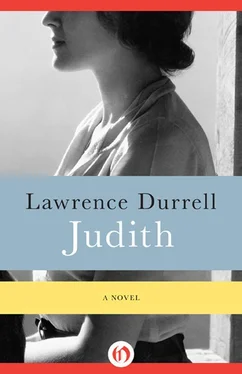David looked it over hastily, greedily, and laughed incredulously.
“What a coincidence,” he said. “Just the man I had been told to capture.”
“I heard that the Haganah were busy catching war criminals.”
“It’s true. I had been told to pick a mission to get this particular one. But alas it is not going to work.” He shook his head sadly.
“Why not?” she said sharply.
“Identification,” he said. “We are not absolutely certain as yet that he is Schiller. We can’t afford to make a mistake — carry off some innocent Swiss and cause a diplomatic incident. We must be sure.”
“Well, I am sure,” she said. “He is my husband; and I must find a way to get to him. If you won’t help me I must go alone.”
David stared at her with open mouth. “Husband!” Then his face fell. “Do you… are you still… in…
Her harsh laugh surprised him. “He has some information which I must get out of him. Will you go, and will you take me? And when?”
“You must give me time. It’s not my decision, you know. And besides, it will be dangerous. Port Said is seething with spies.”
“I will identify him for you; the rest is up to you. Bring him back here where I can talk to him. Please, David.” She squeezed her hands together so violently that the knuckles went white.
“I’ll ring you first thing in the morning,” he said. That was all. But he still stood looking her over with sorrowful attention.
“It isn’t what you think,” she said. He left without a word.
The decision having at last been taken, and the raid planned in detail, Grete took a week’s leave from the office, telling Lawton that she was going to spend a few days on the Dead Sea with a girl friend.
“Well,” he said, “there at least you can come to no harm. I understand you can’t sink even if you try; and poor old Carstairs used to quote a rather sinister epigram about the place which ended:
‘Here the Sodom sunlight blisters
Queen Alexandra’s nursing sisters’.
So watch your step.”
“I promise,” she said.
“Everything may have changed by the time you get back,” he said gravely. “We have an Immediate from the Secretary of State this morning. They are going to take the Jewish case to UNO.”
“Are they?” she cried. “What a relief.”
“Misguidedly in my view,” he said. “We shall lose the vote, and lose Palestine as well.”
“Then what?”
“Happily for me we shall be withdrawn from here; and the Jews will be left to the tender mercies of the Arabs. Grete, I’m going to ask you something when you come back. Something personal.”
Once more back in the comparative isolation of Ras Shamir, Judith threw herself into the ordinary work of the kibbutz with a new energy and delight, due partly to the knowledge of Aaron’s return and partly to her own returning physical health. Of the future she did not wish to think in any detail, so perfect was the notion of a present in this quiet valley. Once she managed to spend the day in Jerusalem, engaged in consultations with the physicists at the Institute: she telephoned to Aaron but he was away in the desert, and she had to be content to return without seeing him. Nor did he ever write. The three months until his return seemed an eternity, but in the end they passed, and once more she saw him riding his little white horse across the valley, and once more they were free to visit his tumbledown shack of a “country house” to pick the wild flowers which had taken possession of the abandoned garden. As if by common consent, they did not speak of the future, did not try and peer into the mists ahead. They were content to inhabit the sunlit present, to enjoy each other without premeditation.
But the country was changing around them, and even here, in this sleepy valley, they could not fully escape the pressures of history. A new and bitter purposefulness had begun to grow up. Even Aaron had become harder, more masterful, more self-possessed. New faces appeared at the kibbutz now — the weary but determined faces of the soldiers back from active service with the Jewish Brigade. Their features were engraved with a new determination — a new purpose. The secret preparations for defence of the kibbutz also altered with the influx of better weapons, sterner training. Aaron had begun to think professionally now of times, dispositions, tactical arrangements. He was still a general without an army, but the force he would dispose of in case of trouble had now become a considerable one, for each of the mountain kibbutzim had set aside a promised task-force to come to the aid of Ras Shamir if it were attacked; and of course the kibbutz in its commanding position was the valley’s key and central prop. Situated where it was, it was terribly vulnerable.
New activities pressed upon him; small groups of young men from the underground came in from time to time to visit him with news. There were long confabulations by lamplight. News was exchanged in conspiratorial tones now. The country was full of British troops whose task it was to smother the smouldering unrest in both Jewish and Arab hearts. “We are slowly passing through the eye of the needle,” Aaron would say. Though it made her sick at heart, she too began to feel the thrill of a new purpose. It was infectious, it was in the air. Was the idea of Israel then a realizable reality? But side by side with this was also a fear for his physical safety. New operations were being planned. Day by day the toll of sabotage mounted.
One morning she saw Aaron talking to an elderly man who seemed vaguely familiar; she recognized the old sea captain who had brought her through the blockade in the “Zion”. It was Isaac Jordan. He, for his part, hardly recognized her, so much had she changed, but it did not in the least qualify his delight at seeing her. He was driving about the country in an old car, whose sides bore the legend “FRESH FRUITS AND VEGETABLES LTD.” The old “Zion”, he said, had sprung a leak and was being docked for overhaul. “But bless you,” he said, “I can’t sit idle at my time of life. My mother always told me that Satan would find work for idle hands to do. So I’ve gone into market-gardening. Look.” He pulled aside a tarpaulin. The whole of the back was indeed full of crates of vegetables. Isaac winked and, puffing at his pipe gingerly, removed one of the crates as one might remove a brick from a wall. “Peek through,” he said airily. Aaron did so and whistled. “All for us,” he crooned, and Jordan waved a great paw in a gesture of liberality. “All for you,” he said. “Hand-picked stuff with the dew fresh on it.”
Aaron produced a pad and pencil and Jordan recited in a low voice: “Thirty Tellers Mark 4, twenty cases of industrial dynamite, four drums of signal wire…
She moved off to allow them to talk privately, and presently heard the truck rumble away towards the underground arsenal where Anna, bright-eyed and chuckling, would doubtless be delighted at this offering.
That afternoon Aaron seemed preoccupied and thoughtful, and she sensed that something was going forward which concerned him. At last he told her. “There’s an ammunition ship in Haifa harbour which they want to blow up. The job has fallen to me. Isaac is arranging the details. It’s apparently very sketchily guarded and he thinks we could get aboard as a ration party with a few cases of fresh vegetables.”
“When?”
“Tuesday.”
She thought wildly for a moment. “You need not worry,” said Aaron. “Isaac never makes foolhardy gestures. He says it is as safe as houses. They have the uniforms and the passes and everything.”
“I’m coming with you,” she said.
Читать дальше












